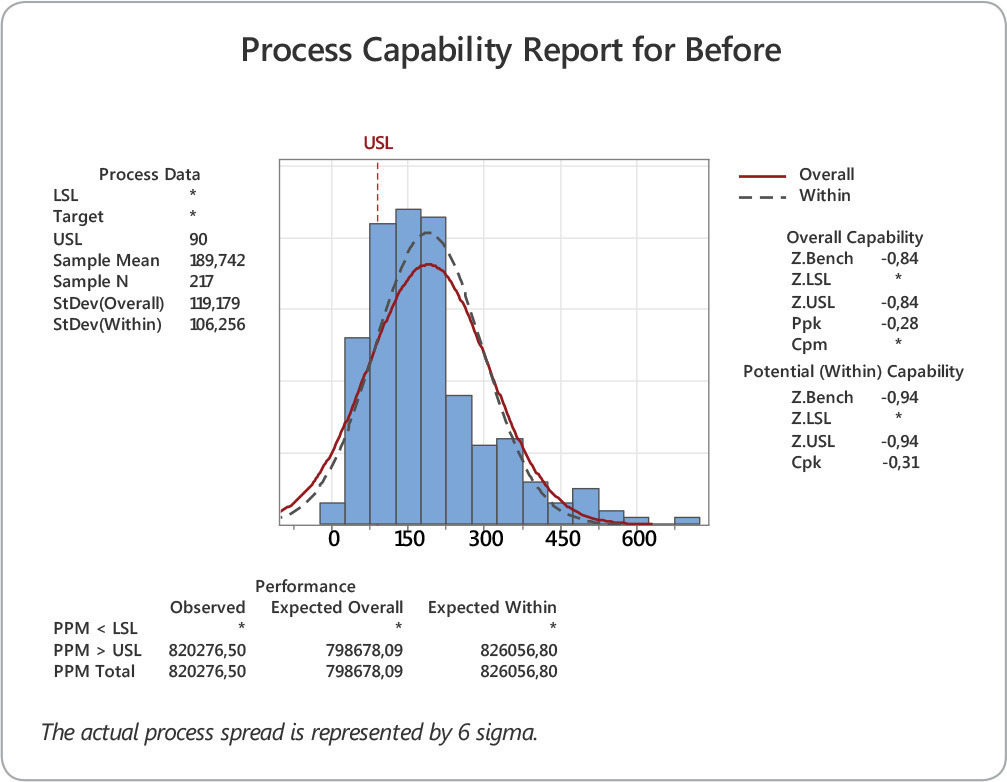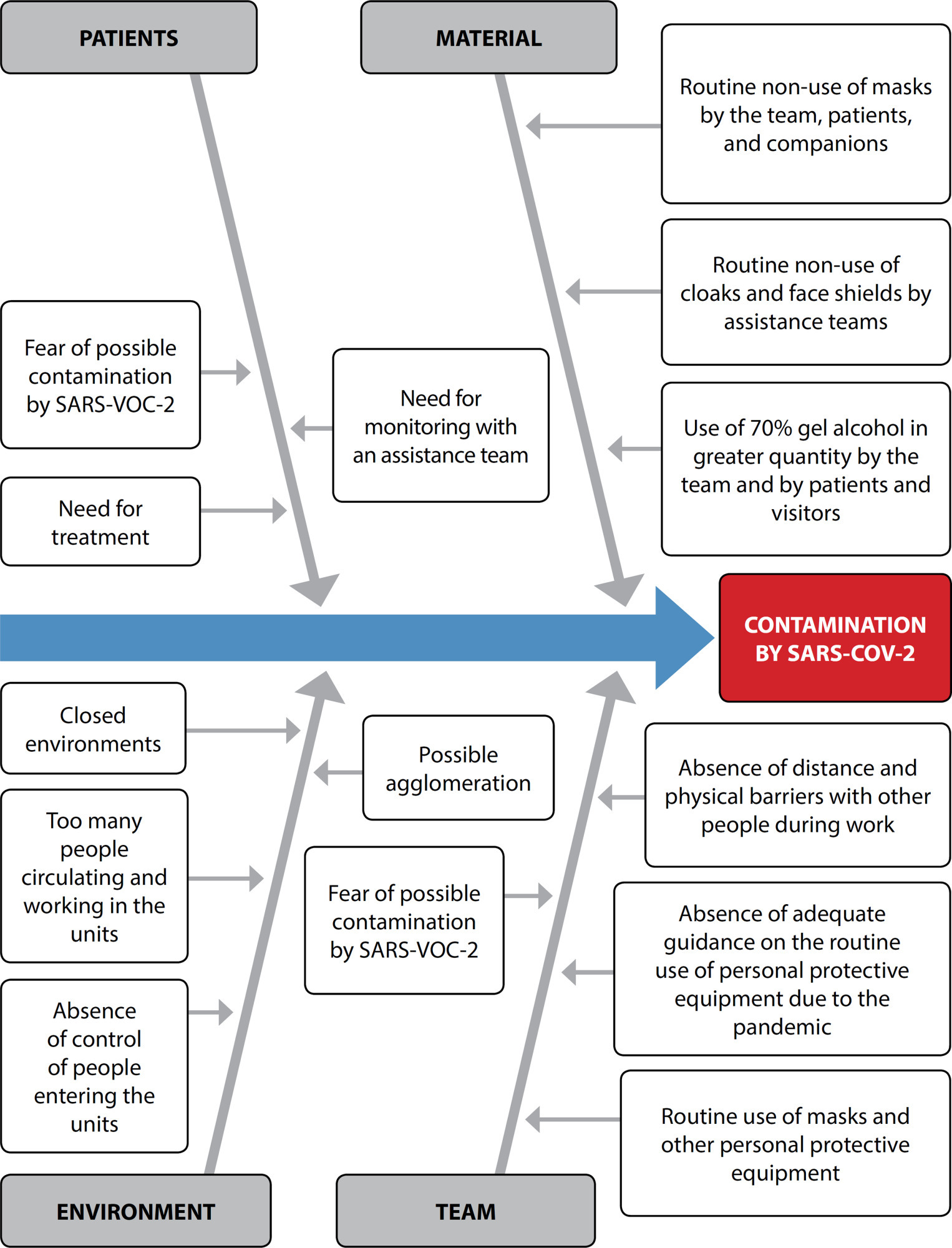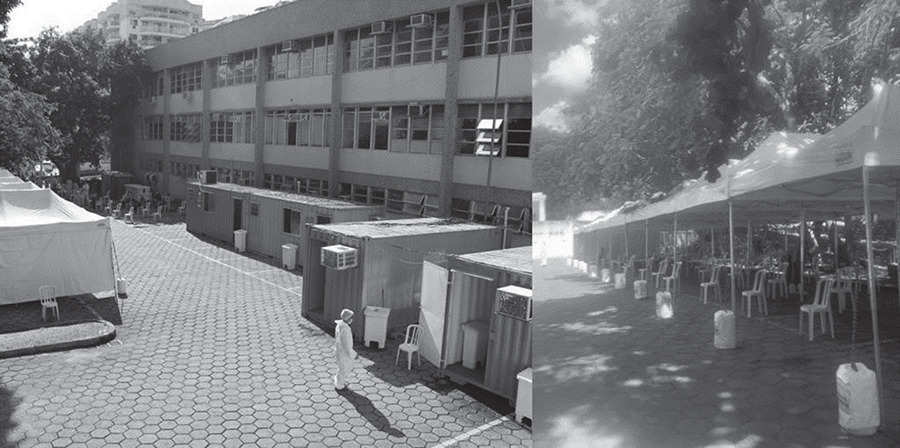-
ORIGINAL ARTICLE
Knowledge sharing: nurse managers’ practices
Revista Brasileira de Enfermagem. 2024;77(5):e20230287
11-22-2024
Resumo
ORIGINAL ARTICLEKnowledge sharing: nurse managers’ practices
Revista Brasileira de Enfermagem. 2024;77(5):e20230287
11-22-2024DOI 10.1590/0034-7167-2023-0287
Visualizações0ABSTRACT
Objective:
To analyze how management practices for sharing knowledge are developed in public hospitals in the context of nursing.
Methods:
Qualitative research, carried out with 15 nurse managers from six public hospitals, from July to September 2022. Data were collected through semi-structured interviews and analyzed according to content analysis and in a model for sharing knowledge at work.
Results:
Knowledge sharing in nursing occurs through intraand extra-organizational training (training, courses and events), use of digital communication tools (media and social networks) and individual and collective contact between professionals during the service (experiences, exchange of experiences and assessment feedback).
Final considerations:
Sharing knowledge is relevant to nursing work. To improve it, it must be understood that effective sharing occurs from person to person, in their daily practices, and must be conducted as a strategically planned process by nurse managers.
Palavras-chave: Health Information ManagementHealth Services AdministrationKnowledge ManagementNursing Service, HospitalNursing Staff, HospitalVer mais -
ORIGINAL ARTICLE
Prenatal assessment of high-risk pregnancies in primary and specialized outpatient care: a mixed study
Revista Brasileira de Enfermagem. 2023;76(5):e20220420
11-10-2023
Resumo
ORIGINAL ARTICLEPrenatal assessment of high-risk pregnancies in primary and specialized outpatient care: a mixed study
Revista Brasileira de Enfermagem. 2023;76(5):e20220420
11-10-2023DOI 10.1590/0034-7167-2022-0420
Visualizações0ABSTRACT
Objectives:
to assess high-risk prenatal care and identify strategies for improving care.
Methods:
a mixed study of a prospective cohort, with 319 mothers in a public maternity hospital, from October 2016 to August 2017, using a semi-structured instrument and interview. Analysis was performed using the chi-square test (p≤0.05). The qualitative approach was carried out through interviews with guiding questions to 13 managers, at their workplace, between January and March 2020, analyzed under social phenomenology.
Results:
higher rates of inadequacy were identified for all criteria. However, when care was shared, there was a higher rate for performing tests (p=0.023), consultations (p=0.002), risk stratification (p=0.013) and emergency information (≤0.000). Weaknesses in the record evidenced impairment in communication and continuity of care.
Final Considerations:
shared care is a strategy for improving care, however there is a need to strengthen effective referral and counter-referral to care continuity.
Palavras-chave: Health Services AdministrationPregnancy, High-RiskPrenatal CarePrimary Health CareSecondary CareVer mais
-
ARTIGO ORIGINAL
Lean Six Sigma methodology to improve the discharge process in a Brazilian intensive care unit
Revista Brasileira de Enfermagem. 2023;76(3):e20220538
07-10-2023
Resumo
ARTIGO ORIGINALLean Six Sigma methodology to improve the discharge process in a Brazilian intensive care unit
Revista Brasileira de Enfermagem. 2023;76(3):e20220538
07-10-2023DOI 10.1590/0034-7167-2022-0538
Visualizações0ABSTRACT
Objectives:
to describe the Lean Six Sigma implementation process to improve the discharge process in a Brazilian health institution’s ICU.
Methods:
prospective study following the Define-Measure-Analyse-Improve-Control project development method. This method consists of five phases, namely: project definition, measurement of the starting point and data collection, analysis of results, improvement in processes, and statistical control.
Results:
applying Lean Six Sigma methodology following the Define-Measure-Analyse-Improve-Control in the discharge process from the intensive care unit to the inpatient unit was effective in improving processes. This improvement represented a reduction in the mean patient transfer time to the inpatient unit from 189 minutes to 75 minutes, representing a 61% improvement in discharge time.
Conclusions:
this article demonstrates the effectiveness of applying Lean Six Sigma methodology to improve the discharge flow in a critical unit, resulting in time and waste reduction.
Palavras-chave: Health Services AdministrationIntensive Care UnitsPatient DischargeTotal Quality ManagementWorkflowVer mais
-
EXPERIENCE REPORT
Actions of a regulatory nurse in the management of surgical waiting lists
Revista Brasileira de Enfermagem. 2022;75(2):e20201233
10-01-2022
Resumo
EXPERIENCE REPORTActions of a regulatory nurse in the management of surgical waiting lists
Revista Brasileira de Enfermagem. 2022;75(2):e20201233
10-01-2022DOI 10.1590/0034-7167-2020-1233
Visualizações0ABSTRACT
Objectives:
to describe the actions of the regulatory nurse in the management of waiting lines for elective surgeries in a public hospital.
Methods:
this is an experience report about the actions of the regulatory nurse in the management of waiting lines for elective surgeries.
Results:
the results of this initiative were: diminution in waiting times; elimination of discrepancies that led to access inequality; promotion of safer treatments; actions of the nurse as a manager, conducting and mediating situations between services; autonomy from the high management of the hospital with regard to the manager of waiting lists; and effective communication due to a constant feedback with the medical teams.
Final Considerations:
the management of the surgical waiting lists must be continuous and systematic, and it must be broader, to include teams that are not involved yet. This initiative can be replicated and improved in other health organizations.
Palavras-chave: Elective Surgical ProceduresHealth Services AdministrationTechnology Applied to Waiting ListsUnified Health SystemWaiting ListsVer mais -
EXPERIENCE REPORT
Mobile pre-hospital care reorganization during the COVID-19 pandemic: experience report
Revista Brasileira de Enfermagem. 2022;75(Suppl 1):e20200826
09-29-2022
Resumo
EXPERIENCE REPORTMobile pre-hospital care reorganization during the COVID-19 pandemic: experience report
Revista Brasileira de Enfermagem. 2022;75(Suppl 1):e20200826
09-29-2022DOI 10.1590/0034-7167-2020-0826
Visualizações0ABSTRACT
Objective:
To describe the reorganization of Belo Horizonte’s Mobile Emergency Care Service during the new coronavirus pandemic using the Plan Do-Check-Act quality tool.
Methods:
Descriptive study, of the experience report type, on the reorganization of care in a mobile pre-hospital care service during the new coronavirus pandemic, from March to July 2020. The Plan-Do-Check-Act quality tool was applied for the process.
Results:
Preparation of care protocol, meetings, training, addition of ambulances, hiring of professionals, and other actions were carried out, with subsequent evaluation and monitoring. When failures or new needs were identified, actions and changes were implemented while keeping monitoring and evaluation during the work routine.
Final considerations:
The reorganization of the service through the construction of a protocol and using the Plan-Do-Check-Act as a management tool was essential to promote safe care for professionals and patients.
Palavras-chave: AmbulancesCoronavirus InfectionsEmergency Medical ServicesHealth Services AdministrationPandemicsVer mais
-
EXPERIENCE REPORT
Care management in coping with COVID-19 at a teaching hospital
Revista Brasileira de Enfermagem. 2021;74(suppl 1):e20200970
06-11-2021
Resumo
EXPERIENCE REPORTCare management in coping with COVID-19 at a teaching hospital
Revista Brasileira de Enfermagem. 2021;74(suppl 1):e20200970
06-11-2021DOI 10.1590/0034-7167-2020-0970
Visualizações0ABSTRACT
Objective:
to report the experience of implementing care management strategies in coping with the COVID-19 pandemic in a teaching hospital.
Method:
this is an experience report of the managers who work at the largest public hospital in Paraná with functions as Head of the Care Management Division, Head of the Care Lines Management Sector, Head of the Infectiology Unit and support team.
Results:
care management strategies were structured based on the service dynamics; physical structure; human Resources; professional and user safety.
Final considerations:
preparing for a pandemic involves measures that include modifying infrastructure and processes, managing employees and users, infection prevention strategies, and clinical recommendations. These measures are necessary to optimize the quality of care provided to users with COVID-19 and to reduce the risk of viral transmission to other users or health professionals.
Palavras-chave: BetacoronavirusCoronavirus InfectionsHealth AssistanceHealth ManagementHealth Services AdministrationVer mais -
EXPERIENCE REPORT
Management of coping with the risks of COVID-19 in an onco-hematological outpatient clinic: an experience report
Revista Brasileira de Enfermagem. 2021;74(suppl 1):e20201080
05-21-2021
Resumo
EXPERIENCE REPORTManagement of coping with the risks of COVID-19 in an onco-hematological outpatient clinic: an experience report
Revista Brasileira de Enfermagem. 2021;74(suppl 1):e20201080
05-21-2021DOI 10.1590/0034-7167-2020-1080
Visualizações0Ver maisABSTRACT
Objective:
to describe the experience of a private outpatient network for hematology and oncology treatment in the adoption of management tools to face the risk of contamination by SARS-CoV-2.
Method:
an experience report on the use of a root cause analysis method to identify potential risks of contamination by COVID-19 among patients and employees. Through the risks identified through the Ishikawa Diagram, we built an action plan, linked to the 5W2H tool, for planning and decision-making implemented.
Results:
the number of attendances in person and people circulating in the units was reduced, protective distance measures and new protection barriers were fundamental to control the risks of spreading COVID-19 in patients and employees.
Final considerations:
the management tools served as a valuable tool in the construction of measures, making the measures in question more clearly and applicable.

-
ARTIGO ORIGINAL
Management of a university ambulatory service: nursing in the coping of the pandemic of COVID-19
Revista Brasileira de Enfermagem. 2021;74(suppl 1):e20200834
04-14-2021
Resumo
ARTIGO ORIGINALManagement of a university ambulatory service: nursing in the coping of the pandemic of COVID-19
Revista Brasileira de Enfermagem. 2021;74(suppl 1):e20200834
04-14-2021DOI 10.1590/0034-7167-2020-0834
Visualizações0ABSTRACT
Objective:
to describe the implementation and management of a restructured nursing service to cope with the COVID-19 pandemic.
Methods:
a descriptive study, carried out at Piquet Carneiro Polyclinic, a university ambulatory unit, which became a reference for testing the severe acute respiratory syndrome coronavirus 2 (SARS-CoV-2) in the city of Rio de Janeiro.
Results:
dimensioning of human resources for nursing was carried out; flows for serving users of the unit and for testing SARS-CoV-2; professional training on prevention practices. From March 18 to July 3, a total of 31214 services were made by the nursing team, 25424 for testing and 453 health professionals received professional training.
Final considerations:
nursing represents an important workforce, planning and management for restructuring health services in an emergency, due to its broad managerial, educative and direct care to the population.
Palavras-chave: Coronavirus InfectionsHealth Services AdministrationInservice TrainingNursingPandemicsVer mais



